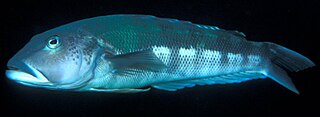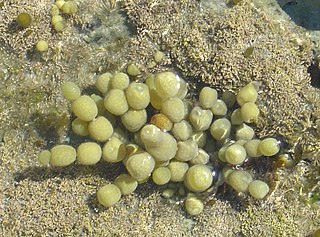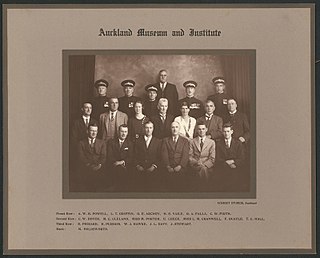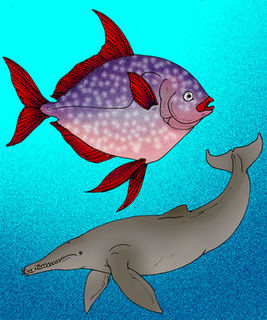
Shepherd's beaked whale, also commonly called Tasman's beaked whale or simply the Tasman whale, is a cetacean of the family Ziphiidae. The whale has not been studied extensively. Only four confirmed at sea sightings have been made and 42 strandings recorded. It was first known to science in 1937, being named by W. R. B. Oliver after George Shepherd, curator of the Wanganui Museum, who collected the type specimen near Ohawe on the south Taranaki coast of New Zealand's North Island, in 1933.

The New Zealand blue cod is a temperate marine fish of the family Pinguipedidae. It is also known variously as Boston blue cod, New Zealand cod, sand perch, or its Māori names rāwaru, pākirikiri and patutuki.

Hector's dolphin is one of four dolphin species belonging to the genus Cephalorhynchus. Hector's dolphin is the only cetacean endemic to New Zealand, and comprises two subspecies: C. h. hectori, the more numerous subspecies, also referred to as South Island Hector's dolphin; and the critically endangered Māui dolphin, found off the West Coast of the North Island.

The New Zealand sea lion, once known as Hooker's sea lion, and as pakake or whakahao (male) and kaki (female) in Māori, is a species of sea lion that is endemic to New Zealand and primarily breeds on New Zealand's subantarctic Auckland and Campbell islands, and have in recent years been slowly breeding and recolonising around the coast of New Zealand's South and Stewart islands. The New Zealand sea lion numbers around 12,000 and is one of the world's rarest sea lion species. They are the only species of the genus Phocarctos.

Jasus edwardsii, the southern rock lobster, red rock lobster, or spiny rock lobster, is a species of spiny lobster found throughout coastal waters of southern Australia and New Zealand including the Chatham Islands. It is commonly called crayfish in Australia and New Zealand and kōura in Māori. They resemble lobsters, but lack the large characteristic pincers on the first pair of walking legs.

Hormosira banksii, also known as Neptune's necklace, Neptune's pearls, sea grapes, or bubbleweed) is a species of seaweed native to Australia and New Zealand. The genus Hormosira is monotypic.

The dumb gulper shark is a rare and endangered deepwater dogfish, known from only along the east coast of Australia and isolated spots north and west of New Zealand. It is also known as the dumb shark, Harrison's deep-sea dogfish, or Harrison's dogfish.

The birdbeak dogfish is a dogfish shark of the family Centrophoridae found in the Pacific Ocean around Honshū, Japan, southern Australia, New Zealand, and Chile, and in the Atlantic Ocean from Iceland south to the Cape of Good Hope.

Captain Frederick Wollaston Hutton was an English-New Zealand scientist who applied the theory of natural selection to explain the origins and nature of the natural history of New Zealand. An army officer in early life, he then had an academic career in geology and biology. He became one of the most able and prolific nineteenth century naturalists of New Zealand.

Arthur William Baden Powell was a New Zealand malacologist, naturalist and palaeontologist, a major influence in the study and classification of New Zealand molluscs through much of the 20th century. He was known to his friends and family by his third name, "Baden".

Dicathais is a genus of predatory sea snails, marine gastropod molluscs in the family Muricidae, the rock snails. This genus is monotypic; the only species in it is Dicathais orbita, common name the white rock shell or cart-rut shell, found round the coasts of Australia and New Zealand.
Alcithoe wilsonae is a species of rare large sea snail, a marine gastropod mollusc in the family Volutidae, the volutes.
Lissotesta is a genus of minute sea snails or micromolluscs, marine gastropod molluscs, unassigned in the superfamily Seguenzioidea.

Penion is a genus of large marine snails, commonly known as siphon whelks, classified within the mollusc family Austrosiphonidae, the true whelks.

Antimelatoma buchanani is a species of predatory sea snail, a marine gastropod mollusc in the family Pseudomelatomidae.

Waipatia is an extinct genus of whale from the late Oligocene (Chattian) of New Zealand.
Specula retifera is a species of minute sea snail, a marine gastropod mollusc in the family Cerithiopsidae.
William B. Rudman, usually known as Bill Rudman, is a malacologist from New Zealand and Australia. In particular he studies sea slugs, opisthobranch gastropod molluscs, and has named many species of nudibranchs.
Mauidrillia is a genus of sea snails, marine gastropod mollusks in the family Horaiclavidae, the turrids.

Wendy Alison Nelson is a New Zealand marine scientist and world expert in phycology. She is New Zealand's leading authority on seaweeds. Nelson is particularly interested in the biosystematics of seaweeds/macroalgae of New Zealand, with research on floristics, evolution and phylogeny, as well as ecology, and life history studies of marine algae. Recently she has worked on the systematics and biology of red algae including coralline algae, distribution and diversity of seaweeds in harbours and soft sediment habitats, and seaweeds of the Ross Sea and Balleny Islands.














